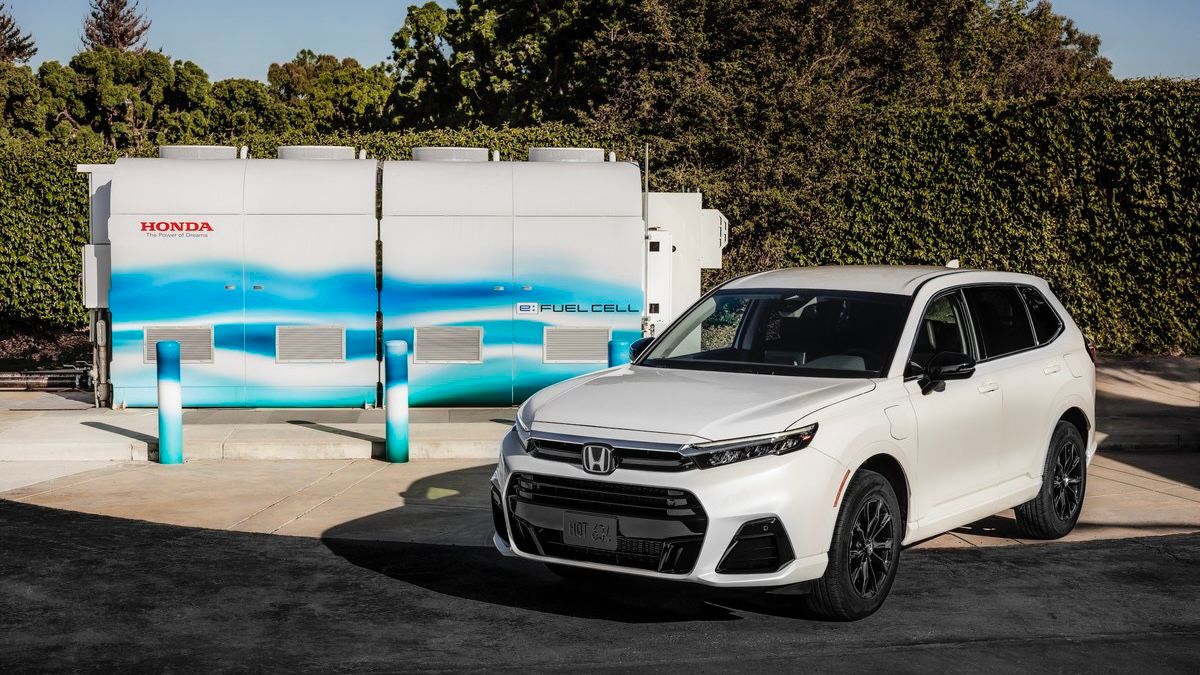Honda showed its pioneering plug-in hydrogen fuel cell electric vehicle for the first time on Tuesday.
The CR-V e:FCEV uses its bestselling compact SUV as the mule for a technology that combines battery electric and hydrogen fuel cell electric propulsion in a single vehicle. It is the first EV of its kind in the U.S.
“Leveraging Honda fuel cell technology expertise continues to play a critical role in our global goal to achieve carbon neutrality for all products and corporate activities by 2050,” American Honda Motor Co. senior vice president Mamadou Diallo said in a statement.
Honda is one of several automakers that have announced a specific timeline for phasing out the sale of fossil-fuel-powered vehicles. Honda plans to sell only 100% zero-emission models by 2040. Those vehicles will be a combination of battery electrics, hydrogen fuel cell electrics and those that combine the two like the new CR-V e:FCEV.
Available for lease in California later this year, the e:FCEV combines the fast fueling of hydrogen fuel cell technology with more readily accessible EV charging. Honda says it will be able to travel 270 miles, including 29 miles of EV driving, as rated by the U.S. Environmental Protection Agency. The vehicle will include a built-in system for drivers to locate, and navigate to, both types of fuel.
Similar to many battery electric vehicles already on the market, the Honda e:FCEV will incorporate a 110-volt power outlet that can be used to run small appliances, portable air conditioners, power tools and camping equipment.
Honda is one of a small group of major auto makers developing hydrogen fuel cell electric vehicles. In 2002, it began leasing its FCX fuel cell vehicle to a handful of California drivers. While the FCX and its follow-up, the Clarity FCEV, have been discontinued, Toyota and Hyundai both make fuel cell electrics.
The five-seat CR-V e:FCEV uses Honda’s second generation fuel cell module, which was co-developed with General Motors. The modules will be made in Michigan.
In addition to passenger vehicles, Honda plans to use its fuel cell system to power commercial fuel cell vehicles, construction machinery and stationary power stations. In March 2023, the company began testing a stationary fuel cell power station at its North American headquarters in Torrance, Calif., using it to provide emergency backup power to a Honda data center. Honda plans to roll out similar fuel cell power stations at other Honda facilities and data centers around the world.
The company has also partnered with Isuzu Motors to co-develop a heavy-duty truck powered with fuel cells. The two companies began testing a prototype in Japan in December and plan to introduce a commercial version of the truck in 2027. Hydrogen-powered construction equipment including excavators and wheel loaders are also in the pipeline at Honda.



